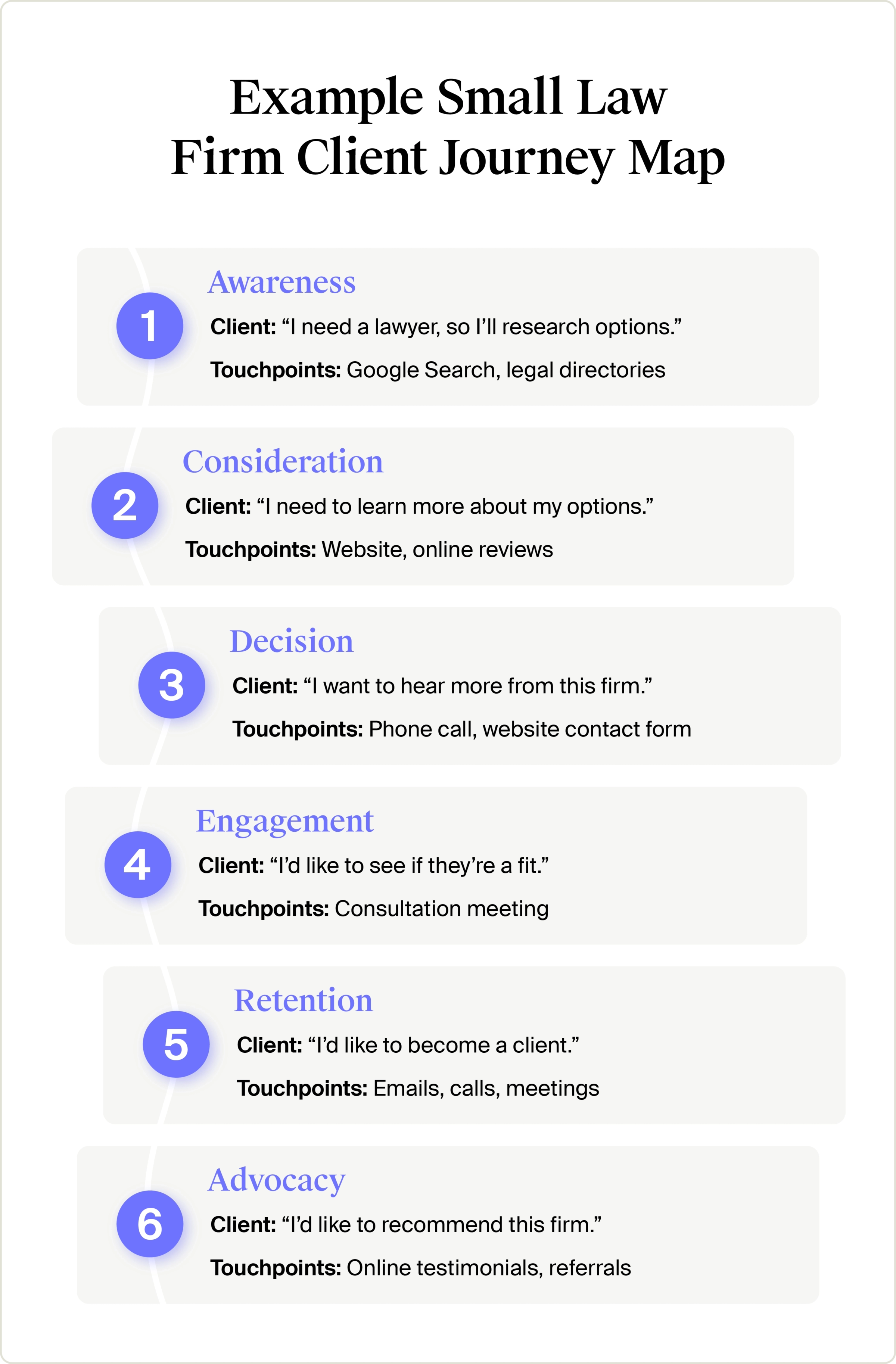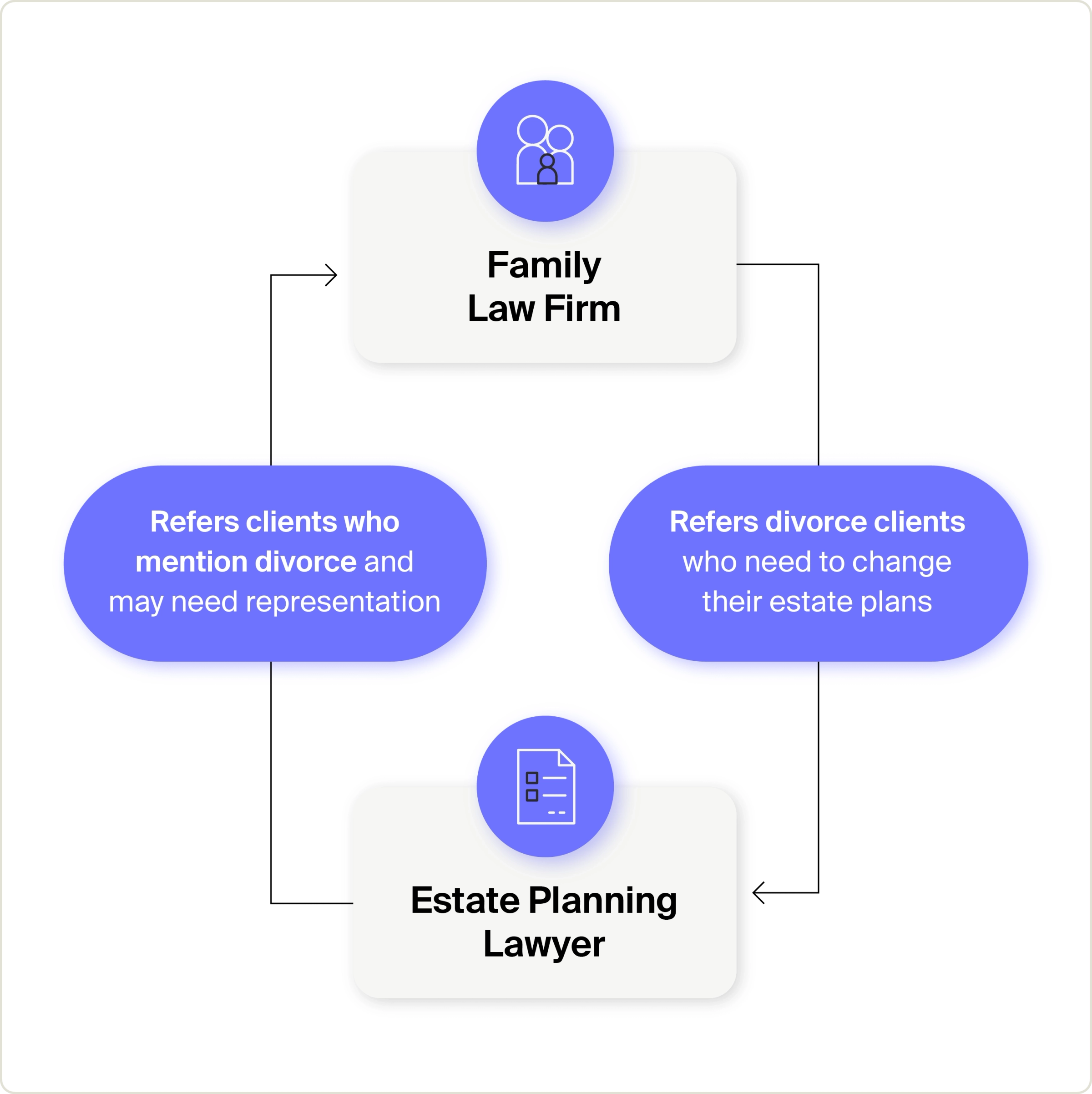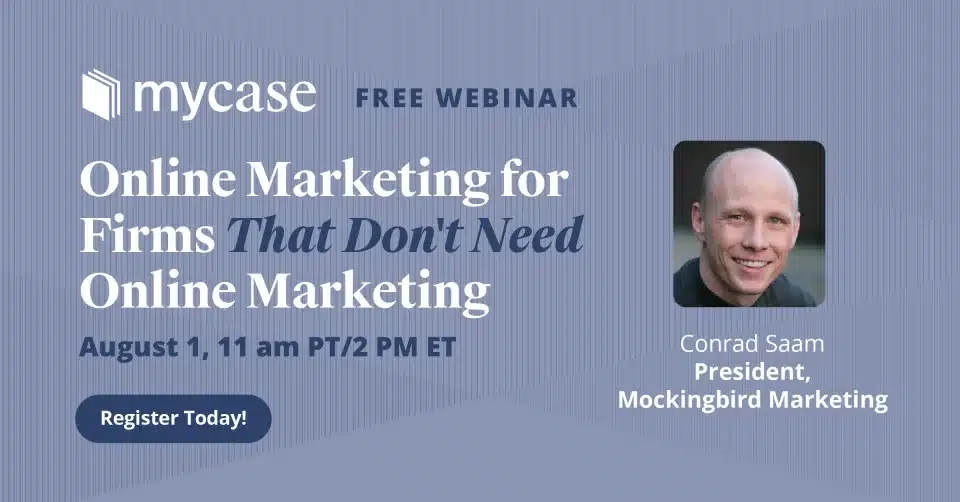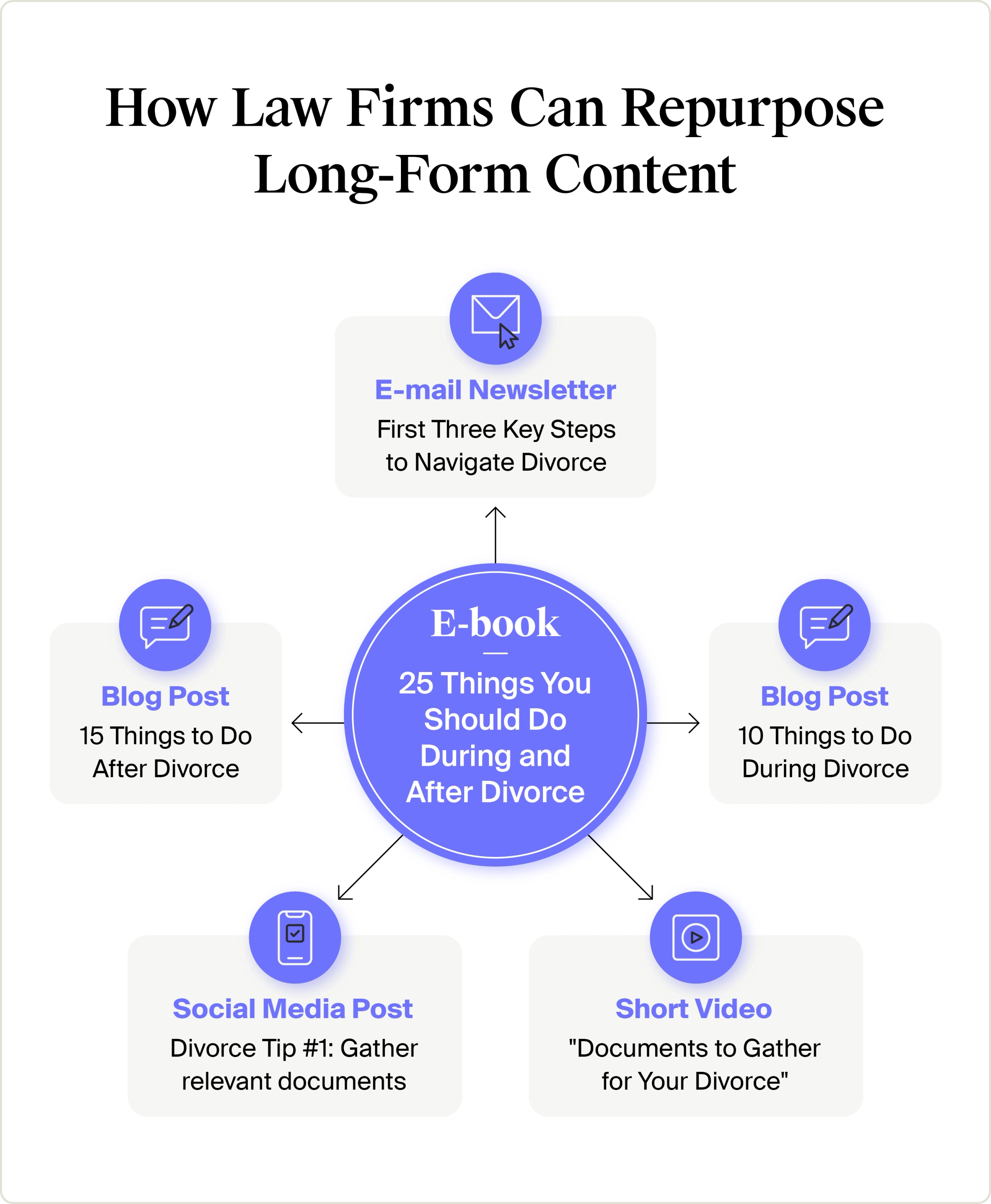Marketing for small law firms is not something that law schools include in their curriculum. Upon graduation, however, it doesn’t take long for lawyers to understand how crucial a strong marketing plan is. The importance of law firm marketing is only magnified for small-firm lawyers whose livelihood depends on their ability to bring clients through the door.
Once a client is in the office, the work only intensifies for a lawyer to convert prospects into clients. In 2023, law firms converted 24% of leads into paying clients. Small law firms that convert clients at lower rates will feel even more pressure to develop a marketing plan that creates a strong pipeline of new leads.
The good news is that small-firm lawyers can overcome them. The key is developing a comprehensive small law firm marketing plan that can easily scale as your practice grows. Below you will find 17 actionable steps that will teach you how to market a small law firm and attract more clients.
1. Identify Your Law Firm’s Focus and Audience
Clarity is the heart of any effective law firm marketing plan. The first way to instill clarity into your marketing plan is to ask yourself: Who am I trying to reach? When answering this question, consider what practice areas you want to provide to clients. A general practice firm covering the gamut from criminal defense to bankruptcy will have a much different marketing plan than a firm focusing on a single practice area, like employment law.
Consider more than just the types of cases you want walking through your door, but also the kinds of people you want to work with. Some law firms are willing to cast a large net while others prefer to provide a more narrowly tailored service.
Consider two law firms: One family law firm wants to focus exclusively on parental and grandparents’ rights. To reach this audience, this law firm can run targeted online ads aimed at people searching for information about visitation rights or local family support groups.
Another law firm may market itself as a full-service criminal defense firm that caters to various income levels. This firm may provide pro bono legal workshops to help establish trust with underserved communities that may need their services. To reach higher-income clients, this firm may also develop referral partnerships with financial advisors or forensic accountants who commonly work with this particular audience. Using tools like AI can automate marketing research like this to deliver data-driven insights more quickly for your firm.

2. Examine the Competition
First, determine which firms are your direct competitors. One strategy is to conduct searches with your core practice area and geography, such as “Orlando bankruptcy attorney,” and see which firms appear at the top of the search engine results page (SERP). Another great avenue for finding your direct competitors is to look for law firms at the top of major legal directories, such as Justia and FindLaw.
Once you grasp the competitive landscape, you can start to review their content, social media platforms, Google reviews, and other information about how they present themselves online. This information will inform you on how competitive your specific legal market is and the marketing ideas that small law firms use nearby.
3. Specify Your Marketing Goals, Budget, and Priorities
Marketing does not happen in a vacuum. It is driven by the goals that you have for the growth of your practice. More calls and more cases are a near-universal goal for law firms, but you may also seek to increase brand awareness, establish a stronger online presence, or improve authority in your specialized niche.
Just as important as the goals you set are the methods you establish for measuring how well you achieve them. There is a broad range of key performance indicators (KPIs) that law firms may monitor depending on the underlying goals. Numbers of leads and cost per lead (CPL) are good measurements for conversion goals. At the same time, website traffic, keyword rankings, and local search metrics can help you gauge the effectiveness of a search engine optimization (SEO) marketing strategy.
Goals and KPIs matter, but the marketing budget for a small law firm greatly influences your marketing strategy. A law firm that spends $3,000 monthly on marketing will have very different expectations than a firm that spends $15,000 monthly. Your goals should be realistic based on the capital you can reasonably invest and the time you and your support staff can afford to spend on marketing initiatives.
In addition, it’s also important to consider the return on investment (ROI) for these efforts.
For example, if your goal is to attract personal injury clients quickly, you can test run some targeted ads to see if the number of clients earned equates to the amount spent on ads.
As a long-term investment, you can also spend time developing high-quality, SEO-optimized blog posts that clients can discover while searching for relevant topics. This may include guides on navigating the personal injury claim process or steps to take immediately after an accident. Compared to ads, the guides may take longer to perform and require a higher upfront investment. However, they can also become a low-maintenance and low-effort source for leads once they rank and appear in search engines.
4. Establish the Brand Identity
Law firm branding goes beyond just telling a prospective client what you do. It tells them who you are, what you believe in, and what principles guide your practice.
Branding messages should be largely the same, regardless of the channel where you present them. A fully developed brand identity ensures that you tell a consistent story to prospective clients, no matter where they learn about you and your firm. Without an established brand identity, marketing efforts appear listless and ineffective.
As you establish your brand, consider the messaging and visual elements, including a logo and a color scheme. Then, when creating content, think about its tone, your key marketing differentiators, and how you can establish a mission statement for the firm.
5. Create an SEO-Optimized and User-Friendly Website
Twenty years ago, an attorney marketing a small law firm could advertise in their local phone book to generate leads. Today, Google reigns supreme, and organic search is where people go to find a lawyer. To rank at the top of a relevant search result in Google or Bing, you’ll need to build a website that allows you to leverage search engine optimization (SEO) strategies.
When building a new website, make sure to do the following:
Craft a user-friendly design: If a website’s design is hard to use, users will simply hit the back button and go elsewhere. A modern and user-friendly design on your website positions your firm as online experts and can help improve your overall conversion rate. When thinking about design inspiration, consider your competitor’s law firm website design to get a sense of what you like from a user perspective.
Secure a reliable hosting partner: For your website to be live, you must partner with a company that will host your domain. Look for a company with a track record of reliability and responsive customer service to help minimize potential technical issues with your website.
Establish credibility: There are a lot of law firms that a potential client could use. You want to make it clear why they should choose you. Adding real testimonials and case results from former clients helps users learn more about you from the client’s perspective.
Implement calls to action: An effective website guides visitors to contact you. The best way to do that is through calls to action (CTAs) that encourage users to do so. Language like “call now” and “contact us” urges visitors to take action by scheduling that first appointment.
Add contact forms: Contact forms are a simple way for visitors to take the next step and reach out to your firm. Our 2024 Benchmark Report found that lawyers with MyCase-designed websites, using embedded “Contact Us” forms, obtained 100,000+ leads in 2023.
A website is a powerful investment for any law firm because it accomplishes multiple purposes within small law firm marketing strategies. Thankfully, building a legal website that looks and feels great doesn’t have to be consuming. MyCase can build a custom website for your firm in as little as 10 days.
6. Attend Networking Events
Networking events are a powerful way for attorneys to build referral networks and become more visible in their community. These events are more than formal events like CE seminars or bar association events. Outside-the-box events like pro bono work with a local nonprofit, sponsoring a community event, or involvement in sports clubs like pickleball or golf are all ways to build your network and name recognition.
Networking is one of the most common marketing tips for small law firms. However, effective networking can be time-consuming to plan for and attend. While networking can bear fruit over the long term, attorneys and their support staff must discuss how they will work together to ensure that client work, law firm operations, and networking events fit everyone’s schedules.
7. Acquire Professional Referrals and Partnerships
Building referral partnerships with other lawyers and professionals creates a win-win scenario for both parties, allowing both sides to develop their client base without spending much time attracting those clients.
For example, an estate planning attorney may partner with a financial advisory firm. The attorney would refer estate planning clients interested in wealth management services to the financial advisor. Similarly, the financial advisor may refer clients who don’t have an estate plan or need to update their existing one.
A small law firm may also strategically partner with other law firms. A common partnership may be a family law attorney developing a relationship with an estate planning lawyer. The family law attorney could refer their divorcing clients who need to overhaul their estate plan, while the estate planning lawyer could refer out clients who mention divorce or other issues that require a family law attorney. Because of this relationship, both firms can get high-quality cases pre-vetted by their referral partner and obtain supplemental income through referral fees.

8. Engage in Local SEO
Local search is becoming an increasingly important element of digital marketing. Local SEO tactics help your law firm appear in search results for local users or those who are physically near your office.
These results will appear in the map section or in a list of the top three local businesses. For Google, you need a Google Business Profile (GBP) to appear in local search. Optimizing your website for local SEO keywords, such as “best divorce attorney in [City Name],” is an effective small law firm marketing strategy that aids in getting your website noticed in local search.
9. Add Your Law Firm to Legal Directories
Creating profiles on major legal directories, including FindLaw, Justia, Avvo, and HG.org, provides several powerful benefits for law firms. Legal directories tend to rank highly in organic search. A profile on these visible sites will also help users find your firm online, even if your website is not yet ranking well.
Additionally, legal directories offer a valuable SEO benefit in the form of backlinks, which is when a trusted third party links back to your website as a source or for further reading. The more backlinks your website has, the more trusted search engines will view your website and, ultimately, will help improve how high your website ranks in organic search.
Legal directories can be an extremely valuable lead-generation tool. Users who visit legal directories tend to be those who are actively searching for an attorney. Referral traffic from a legal directory tends to be higher-quality and more likely to convert than referral traffic from other sources, such as social media.

10. Set up a Referral Program with Clients
Potential clients will want to see social proof of your law firm’s capabilities, and you can do this with a client referral program. After a successful case, ask your client to provide a written testimonial that you can add to your website or that they can post to your social media profiles. Small gestures of thanks, such as a handwritten card mailed to the client, leave a positive lasting impression.
You can help keep your firm top-of-mind for former clients by providing regular touchpoints throughout the year. Also, keep track of former clients’ birthdays so you can send them a birthday card every year. An email newsletter with timely and relevant legal information is another way to help your clients remember your practice when they have friends or family who require your services.
11. Solicit Reviews and Manage Your Online Reputation
Reviews on Google and other popular review websites are a trusted source of information across all industries. The more high-quality reviews you have, the better. Legal consumers want to know they will receive high-quality legal and customer support. One of the primary methods they use is to read reviews and evaluate a firm's average online rating.
Ask your clients to leave a review on Google, Yelp, Facebook, and other social media platforms, or your legal directory profiles. You can even build a review platform into your website, allowing users to leave reviews in one place.
Adding a “review us” link to your email signature is another way to encourage reviews and make it as easy as possible for them.
Managing your online reputation requires more than just soliciting reviews—you should also take the time to respond to all reviews people leave. Best practices for review responses include:
Thanking clients for leaving positive reviews is a small token of appreciation that demonstrates that you are actively engaged with your online accounts.
Responding to negative reviews is even more critical because it publicly demonstrates your commitment to providing excellent customer service.
Apologizing if the reviewer had fair, accurate complaints about the service or outcome they received, and offering to do what is reasonable to make amends.
Providing context for spammy or irrelevant negative reviews can help blunt their impact on your firm.
SEO tip: Reviews are a key factor for local search results, and law firms that receive a high volume of high-rated reviews will perform better in local search than firms that fail to generate reviews.
12. Invest in Paid Online and Social Media Advertising
Organic search can take time for law firms to start seeing results. Firms that want a more immediate return on investment (ROI) in digital marketing should consider investing in paid online and search media advertising.
Advertisements on Facebook and other social media platforms will primarily reach users near the top of the sales funnel. These ads build brand awareness and establish you as a local, trusted thought leader.
Advertising on Google can take the form of pay-per-click (PPC) ads and local service ads (LSA). PPC involves law firms bidding on keywords a user searches for, such as “car accident attorney near me.” LSAs are more narrowly focused on local search results and will surface for users conducting searches in a particular geography.
As with any type of small law firm advertising, your budget will affect how many leads you should expect. Highly competitive legal markets, such as personal injury law in New York City, demand a much higher campaign budget than less competitive legal markets in more rural areas or for more niche practice areas. A small law firm just starting to invest in digital advertising must estimate how many visitors it can reasonably expect with its budget. If the estimates are too low, you can adjust the strategy to target more specific or niche case types with less competition and search volume.
13. Set Up an Email Marketing Campaign
Email marketing is a digital marketing strategy that allows businesses to communicate with current and prospective clients via email. Multiple high-quality, low-cost email marketing platforms will enable you to build your email marketing database. Small law firms can start with relatively few clients and then develop their database over time.
Email marketing is a low-cost tactic that fits into the marketing budget of many small law firms. Email marketing offers several powerful benefits, which include:
Maintaining touchpoints with former clients: Keeping in contact with former clients is crucial when soliciting testimonials, online reviews, or case referrals. Adding satisfied clients to your email database is an easy way to establish ongoing touchpoints.
Increasing website traffic: If you are creating a monthly or quarterly newsletter for your clients, email marketing is a good way to get regular traffic to your website. Higher website traffic is a strong authoritative signal to Google and other search engines, which can improve your performance in organic search.
Saving time: Email marketing, in many cases, is a set-it-and-forget-it campaign. For example, if you are sending a birthday card or a holiday card to past clients, these can be sent as an e-card automatically through the email marketing platform. Rather than working to remember to regularly contact your former clients, your email marketing platform is doing all the work in the background. This frees up time to focus on case work or other high-priority tasks.
14. Create Content to Support Your Online Presence
The adage “content is king” remains as true today as ever. Search engines increasingly prioritize websites in search that house content that demonstrates experience, expertise, authoritativeness, and trustworthiness, or E-E-A-T. For those engaging in small law firm content marketing, this means regularly adding content to your website and creating content that reflects your legal experience and expertise, demonstrates your authority, and establishes you as a trustworthy source.
Consider a family law firm that plans to write an e-book about the 25 things people should do during and after divorce. After completing the e-book, the attorney can repurpose different sections for other channels. They can write blog posts that highlight two or three examples included in the e-book or post shorter, more shareable tips on social media as text posts or short videos.
You can also include portions of the e-book as part of an email newsletter. These methods allow your small law firm to create a content marketing plan without needing to sit down and write everything from scratch.

15. Establish a Social Media Presence
Successful businesses are highly visible, which means having a presence on major social media platforms. For small law firms, this means creating, posting, and interacting on Facebook, LinkedIn, and other high-traffic social media platforms should be a cornerstone of a marketing strategy.
Once you create your profiles, you should publish content regularly. Sharing content you previously created is a quick, easy, and free way to reach your target audiences. Content that resonates is content that your followers may share with their followers. Volunteering events, birthdays, and other celebrations at the firm, or just photos of you participating in local community events, are also excellent to publish on social media—as these help cement you and your firm as key pillars of the community.
The most effective law firms in social media marketing invest the most time. Consider your goals for your social media platforms, such as increased brand recognition, website traffic, or a larger client base. Once you establish these goals, it makes it easier to evaluate whether the time you invest in social media is valuable or if you should spend your time focused elsewhere.
For a deep dive into execution, read our full guide on social media marketing for lawyers, which covers everything from compliance to content calendars
16. Explore the Value of Billboards, TV, and Radio Marketing
Offline marketing is any marketing done outside the internet or digital channels and typically includes billboards, TV and radio advertising, print advertising, and direct mail. It also includes in-person meetings, like conferences, seminars, and networking events.
These avenues help to reach legal consumers who may not be as active online, and they help to further cement the brand promises you make through your online advertising. However, before deciding how to market your small law firm, consider the following pros and cons of offline marketing.
Pros | Cons |
|---|---|
Reaching new audiences that are less tech-savvy | Harder to track ROI |
Establishing strong rapport and connections with the local community | Higher cost to implement |
Easier to build trust with prospective clients | Smaller budgets mean a more limited reach |
17. Evaluate ROI and Adjust
After fully implementing your small law firm marketing plan, it’s essential to review performance by evaluating your ROI. Break out ROI by channel and review it regularly—annually, at a minimum, but ideally on a monthly or quarterly basis. A good or poor ROI will vary depending on the channel, your goals, and the established expectations for what each marketing channel should produce.
When reviewing the ROI, you will want to critically evaluate those channels that are not delivering the return you need. From there, you can adjust the language or approach in those channels. Alternatively, you may shift the time and dollars to another channel, producing higher ROI.
Measuring ROI and adjusting marketing plans is crucial to managing a small law firm, but it can be time-consuming. Investing in the right technology that pulls your KPIs into a single platform will make this process easier. For example, legal marketing software can incorporate established benchmarks, making it clear which channels are either over- or under-performing as you look to make adjustments over time.
Small Law Firm Marketing Tips for Sustainable Growth
Effective small law firm marketing strategies are flexible and agile enough to expand with your growing firm. As you create or enhance your marketing plan, consider the following:
Leverage technology and software automation to speed up marketing tasks.
Consider partnering with legal marketing companies that understand law firm–specific ethics, compliance requirements, and growth stages.
Prioritize quality over quantity; a small number of high-quality marketing deliverables will produce a higher ROI than a large number of low-quality deliverables.
Tailor the language of your marketing messages to target audiences present in each channel.
Become familiar with your state bar’s regulations, and check back regularly as these rules can and will change periodically.

Leveraging Technology for Efficient Lead Management
All of the marketing ideas for small law firms provided here are designed to increase the potential clients, or leads, that your firm receives. Lead management is the process of capturing, tracking, and converting leads into paying clients. For small law firms, this means establishing a system that guides leads through the sales funnel, weeds out low-quality or irrelevant contacts, and nurtures high-quality leads to transform from a potential client into an actual client.
Today, lead management has never been easier for law firms to implement. Customer relationship management (CRM) software streamlines this process by helping law firms measure where their leads are coming from, monitor them throughout the sales process, and track KPIs in a single place.
Manage Leads and Customers with MyCase’s Legal CRM Software
Successful law firms not only receive a high volume of quality leads but are also effective at converting those leads into clients. Investing in CRM software designed for law firms can save them time and money while nurturing the leads produced by their marketing efforts.
MyCase’s legal CRM software is a single solution that solves the lead management challenges small law firms face. Our platform allows law firms to embed custom lead forms into their websites, stay on top of prospect pipelines, and make smart, data-driven business decisions for their firm.
Schedule a demo today to see the MyCase CRM software in action and learn how we can increase your client intake volume.
About the author

Justin FisherContent Writer and SEO Strategist8am
Justin Fisher is a Content Writer and SEO strategist for 8am, a leading professional business solution. He specializes in writing about emerging legal technology, financial wellness for law firms, and more.
